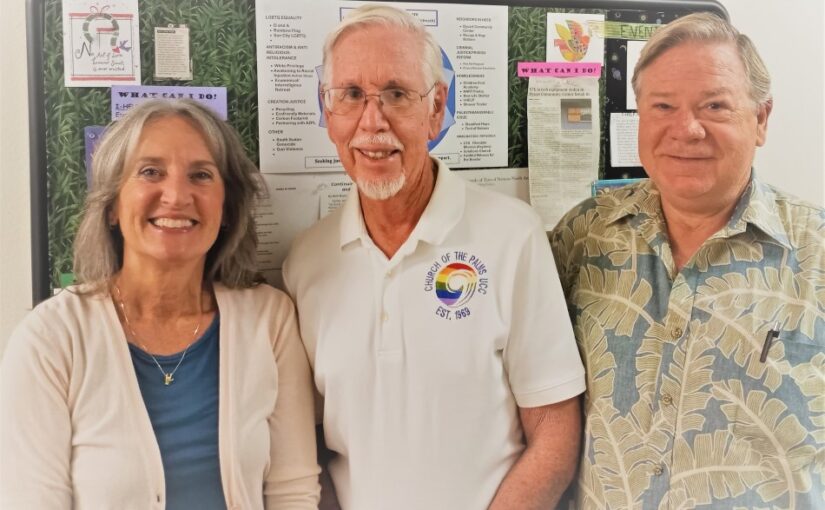Greetings from the Moderator Team.
We are rounding the corner of the calendar year and sending you an August Palm Leaf. We don’t normally send a Palm Leaf in August, but we are in unprecedented times and facing unprecedented issues, challenges, and opportunities to show who we are as followers of Jesus and members of Church of the Palms. So, here is our August Palm Leaf question:
Considering the increasing number of hate crimes, divisive rhetoric about racial justice, political polarization, voter rights questions, and disparity of opportunity between people of color and us white folk, what is our role as mostly retirees living in Sun City, a predominantly white community? Our Social Justice Action Team has embraced the 15 action steps approved and recommended to us by the UCC Southwest Conference. But before we list the action steps, let’s look at some terms important to this topic, some are familiar, some may be new:
Prejudice — A pre-judgment or unjustifiable and usually negative attitude of one type of individual or groups toward another group and its members. Such negative attitudes deny the right of individual members of certain groups to be recognized and treated as individuals with individual characteristics.
Bigotry — Intolerant prejudice that glorifies one’s own group and denigrates members of other groups.
Racism — A system in which one race maintains supremacy over another race through a set of attitudes, behaviors, social structures, and institutional power.
Microaggressions — The everyday verbal, nonverbal, and environmental slights, snubs, or insults, whether intentional or unintentional, which communicate dismissive, hostile, derogatory or negative messages to target persons based solely upon their affiliation with a marginalized group. Microaggressions can be committed against any such group marginalized in our society – People of Color, LGBTQ people, women, people with disabilities, people from other faiths traditions.
White fragility — A state in which even a minimum amount of racial stress becomes intolerable (for white people), triggering a range of emotions such as anger, fear, and guilt, and behaviors such as argumentation, silence, and leaving the stress-inducing situation.
White privilege — Refers to the unquestioned and unearned set of advantages, entitlements, benefits and choices bestowed on people solely because they are white. Generally, white people who experience such privilege do so without even knowing it.
Complicity – any direct or indirect action that perpetuates a system of racism, privileging Whites above others.
OK, having reviewed some old familiar terms and looked at a few new ones, what can we do to help bridge the racial divide that exists in our country. Here are those action steps from the Southwest Conference that the Social Justice Action Team is embracing:
- Speaking up whenever you hear a comment or joke that marginalizes Black, Indigenous, and other People of Color.
- Asking Black, Indigenous, and People of Color what their needs are.
- Using your money to support businesses and ministries of Black, Indigenous, and People of Color.
- Forming partnerships with congregations of Black, Indigenous, and People of Color.
- Reading books, watching performing arts events, and drawing on theological resources featuring Black, Indigenous, and People of Color to deepen understanding and appreciation of the history, contributions, and culture of these groups of people.
- Learning with white friends and family about white privilege, white fragility, and white supremacy.
- Preparing church newsletter articles featuring the contributions of, and/or discriminatory practices against, Black, Indigenous, and People of Color.
- Telling and hearing the stories of Black, Indigenous, and People of Color and their rich and diverse heritage in New Mexico, Arizona, and Texas.
- Including elements in worship services that reflect the needs and experiences of Black, Indigenous, and People of Color present in your congregation and in your community.
- Inviting Black, Indigenous, and People of Color into leadership roles and explore governance structures that reflect their experience.
- Learning about and supporting organizations in New Mexico, Arizona, and Texas that make it a mission to be advocates for racial equality and work against racial injustice.
- Writing op-eds or letters to the editor about issues of bigotry, white supremacy, or racism in your communities.
- Assessing your congregation’s racial diversity, equity and inclusion. Participate in the UCC’s racial diversity, equity, and inclusion assessment of the National setting of the United Church of Christ.
- Inviting a Sacred Conversations to End Racism facilitator of the Southwest Conference to present a program in your congregation. (Please consider attending the Sept. 7 Ecumenical Retreat in Prescott: Solidarity—Anti-Racism Training—Rev. Joan Crawford)
- Making a public witness like putting a Black Lives Matter sign at your church or on your lawn and prepare yourselves to welcome Black, Indigenous, and People of Color who may come to our churches, and for conversations with people who demonstrate white fragility because you take this step.
Some of these action steps we are already taking. Others will require more work. But what the Mod(erator) Squad and Social Justice Action Team loves about Church of the Palms is that we “Share God’s Unconditional Love, (Racial) Justice and Extravagant Welcome.” May it be so in increasing measure!
